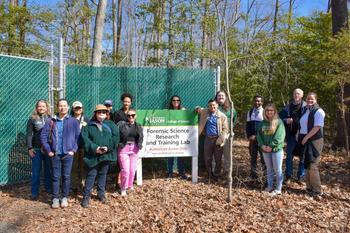On the morning of Friday, March 1, Christine Landoll, director of business engagement at the Costello College of Business at George Mason University, welcomed guests to the Forensic Science Research and Training Laboratory, or “body farm,” on George Mason University’s Science and Technology Campus in Prince William County.

The presentation and subsequent tour were specifically set up to showcase emerging research and scientific capabilities to Naval Criminal Investigative Service (NCIS) officials Elizabeth Pierri, Tristy Terwilliger, and Kay Een. Landoll met Een, NCIS chief diversity and inclusion officer, through the Costello College of Business’s chief diversity, equity, and inclusion officer program and arranged a visit to the body farm, Een agreed instantly. Other representatives of the Costello College of Business included Patrick Soleymani, associate dean for outreach and strategic engagement and Jim Wolfe, entrepreneur in residence.
Following brief introductions in the classroom, Joseph DiZinno, associate professor of the forensic science program, gave an overview of the purpose of the body farm and their focus on human location and identification. Next, Mark Wilson, associate professor of the forensic science program, delved deeper into the methods of extracting, testing, and identifying DNA. Mary Ellen O’Toole, director of the forensic science program and former FBI profiler, discussed what the guests could expect after their walk to the outer four acres of the property comprising the body farm.
Awaiting the first human cadaver donor, the body farm is currently researching pig cadavers. The visitors were led to the fenced in area, avoiding the section where predators–likely racoons or foxes–dug up the cadavers. Animal activity is just another variable that forensic specialists must contend with. Out there in the field, the body farm experts showed how the chemistry and science are being put to practice, including how they use trained dogs to sniff out cadavers, insert probes into the ground to identify remains based on the chemical emitted, and use ground penetrating radar.
Throughout the classroom session and body farm tour, there was an open dialogue with the NCIS officials. They agreed that the morning marked the beginning of an exciting collaboration, one in which the faculty members and students working on the body farm can learn what agencies like the NCIS require to be most effective in their investigations and, as they observed, there is an abundance of applicable science and technology that NCIS can learn from the body farm. It is very much a cross-collaborative effort. Though housed within the College of Science at George Mason University, the body farm is a wonderful example of the power and impact of interdisciplinary work at Mason providing real-world experiential opportunities for Mason students.
“I don't know what made me the proudest, the tour, which demonstrated the power that is Mason–cutting-edge research, innovation in action, and working together to solve real-world challenges through which three colleges were represented, Science, Business, and Engineering and Computing alongside NCIS; seeing our strong, dedicated students at the center knowing Mason is building the next generation of leaders that will impact the world around us; or seeing the future being created with the ideas and insights shared at one of the eight body farms in the nation,” says Landoll.
When it comes to criminal investigations, much of what was impossible is now possible through science. George Mason’s body farm is not only a learning experience for students, but it offers real solutions to investigators. "It's inspiring to witness the collaboration between students and educators in exploring the latest technological advances in forensic science,” says the NCIS officials. “The work conducted at the Forensic Science Research and Training Laboratory has significantly evolved from being a notional idea to a solid foundation of research and validation of scientific hypotheses. These advancements will play a crucial role in either exonerating or implicating future suspects, as well as in identifying and locating victims, providing law enforcement with invaluable leads. We look forward to witnessing the accomplishments of the next generation of forensic scientists and am eager to pass the torch to this remarkable team."
